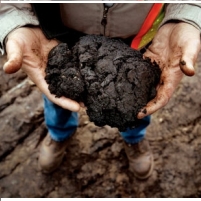Oil Companies Kick the (Aluminum) Can Down the Road Toward Toxic Oil Sands
Saturday, July 16, 2011
 Oil sands
Oil sands
Environmentalists loathe the rush to develop Canada’s vast oil sands reserves containing an enormous amount of crude and a wealth of potential harm to North American ecology.
Within the province of Alberta is an estimated 171.3 billion barrels of oil which, if fully developed, would put Canada in the same camp as OPEC’s leader, Saudi Arabia (which has reserves of 264.2 billion barrels). As Canadian oil businesses extract the crude from its sandy confines, the region has become polluted with toxic ponds and fouled terrain, leading one UN expert to compare the place to Mordor, the fictional dark realm of Middle Earth created by J. R. R. Tolkien.
Oil sands also pose a problem for the struggle to reduce emissions causing global warming, because it is one of the most greenhouse gas-intensive types of oil in existence.
But the environmental impact of the oil sands extraction doesn’t stop in Alberta. Some of the oil is piped to Cherry Point, BP’s refinery in Washington State. There, the crude is broken down to produce transportation fuel, and a leftover of this process is a tarry residue that eventually gets turned into petroleum coke, or petcoke, an industrial solid that helps manufacture aluminum cans.
Cherry Point’s website boasts that “one in six aluminum cans is made using BP Cherry Point’s calcinated coke.”
And along the way more greenhouse gases are released, with petcoke putting out twice the emissions of natural gas.
If Canadian and American oil companies get their way, oil sands will eventually be shipped to U.S. refineries near the Gulf of Mexico. This endeavor will require the building of a north-south transcontinental pipeline that has environmentalists alarmed. Just look at the recent spill in the Yellowstone River, they say, and what even a small amount of oil could do to endanger a pristine body of water. Imagine what it might be like if the proposed pipeline sprung leaks under, across or near any number of important waterways in the West?
Environmentalists don’t want to consider the risk and are steadfast in opposing the plan, which the Obama administration is still mulling over.
-Noel Brinkerhoff
Toxic Pop: How Tar Sands Fuel Disposable Cans (by Geoff Dembicki, CorpWatch)
The Risks of the Keystone XL Pipeline (Editorial, Los Angeles Times)
Oil Sands Project in Canada Will Go On if Pipeline Is Blocked (by Ian Austen, New York Times)
- Top Stories
- Unusual News
- Where is the Money Going?
- Controversies
- U.S. and the World
- Appointments and Resignations
- Latest News
- What If China Invaded the United States?
- Donald Trump Has a Mental Health Problem and It Has a Name
- Trump Goes on Renaming Frenzy
- Trump Deports JD Vance and His Wife
- Trump Offers to Return Alaska to Russia






Comments